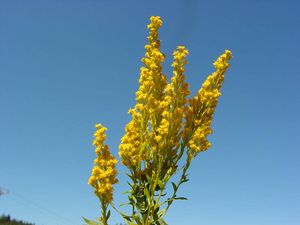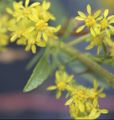Difference between revisions of "Solidago missouriensis"
m (→Description) (Tag: VisualEditor) |
m (Tag: VisualEditor) |
||
| Line 3: | Line 3: | ||
* Common Name: Missouri goldenrod | * Common Name: Missouri goldenrod | ||
* Codon: SOLMIS | * Codon: SOLMIS | ||
| − | |||
==Taxnomy== | ==Taxnomy== | ||
{{Taxobox | {{Taxobox | ||
| Line 35: | Line 34: | ||
==Distribution== | ==Distribution== | ||
East Cascades, and rarely on prairies on west Cascades, central BC to Oregon, east to Rocky Mountains, Great Plains, and Midwest.<ref name=":1">Hitchcock, | East Cascades, and rarely on prairies on west Cascades, central BC to Oregon, east to Rocky Mountains, Great Plains, and Midwest.<ref name=":1">Hitchcock, | ||
| − | C. L., Cronquist, A., Giblin, D., & Legler, B. et al. (2018). ''Flora of | + | C. L., Cronquist, A., Giblin, D., & Legler, B. et al. (2018). ''Flora of'' |
| − | the Pacific Northwest: an illustrated manual''. Seattle: University of | + | the Pacific Northwest: an illustrated manual''. Seattle: University of'' |
Washington Press.</ref> | Washington Press.</ref> | ||
Revision as of 22:45, 2 June 2020
- Scientific Name: Solidago missouriensis
- Family: Asteraceae
- Common Name: Missouri goldenrod
- Codon: SOLMIS
Contents
Taxnomy
| Solidago missoursiensis | |
|---|---|

| |
| Photo by Richard Old, also featured on Main Page | |
| Scientific classification | |
| Kingdom: | Plantae |
| Subkingdom: | Tracheobionta |
| Phylum: | Spermatophyta |
| Subphylum: | Magnoliophyta |
| Class: | Magnoliopsida |
| Subclass: | Asteranae |
| Order: | Asterales |
| Family: | Asteraceae |
| Genus: | Solidago L. |
| Species: | Solidago missouriensis Nutt |
Description
Glabrous perennial from a creeping rhizome, 2-9 dm. tall.
Leaves tending to be triple-nerved, the basal ones oblanceolate, up to 30 cm. long and 3 cm. wide, the others smaller and becoming sessile upward.
Flowers arranged in long narrow panicles. Involucre 3-5 mm. high, pseudanthium made up of 7-13 ray florets and 8-13 disk florets, yellow.[1][2]
Bloom Period
Late June-October[1]
Distribution
East Cascades, and rarely on prairies on west Cascades, central BC to Oregon, east to Rocky Mountains, Great Plains, and Midwest.[3]
Habitat
Rather dry, open places, from the valleys and plains to fairly high elevations in the mountains.[3]
Propagation
Plants established by seedlings can be started by sowing seed in containers in January and placed in a greenhouse. Seed should be covered lightly with soil and kept moist until germination. A layer of pea gravel can be applied to the soil surface to prevent seeds from floating. Seeds planted in this manner will begin germination about Day 7 and complete germination by Day 14. [4]
Photo Gallery
References
- ↑ 1.0 1.1 WTU Herbarium, Burke Museum, & University of Washington. Retrieved from https://biology.burke.washington.edu/herbarium/imagecollection/taxon.php?Taxon=Solidago%20missouriensis
- ↑ Bowcutt, F., & Hamman, Sarah. (2016). Vascular plants of the South Sound prairies (First ed.). Olympia, Washington: The Evergreen State College Press.
- ↑ 3.0 3.1 Hitchcock, C. L., Cronquist, A., Giblin, D., & Legler, B. et al. (2018). Flora of the Pacific Northwest: an illustrated manual. Seattle: University of Washington Press.
- ↑ Skinner, D. 2004. Propagation protocol for production of container Solidago missouriensis Nutt. Plants; USDA NRCS Plant Materials Center, Pullman, WA.



